Gospel Thrillers! Who woulda thought? Many of us knew of books like this, but never realized they were a coherent (sub-)genre, and certainly never thought much about how to understand them.
Here now is Andrew Jacobs second post on his new book Gospel Thrillers: Conspiracy, Fiction and the Vulnerable Bible, which you can get at your favorite book-buying spot, including here: Gospel Thrillers: Conspiracy, Fiction, and the Vulnerable Bible: Jacobs, Andrew S.: 9781009384612: Amazon.com: Books
******************************
II. Inside the Gospel Thrillers
In my first post I described what Gospel Thrillers are and their role in US culture: they magnify, probe, and contain popular fears and desires about the vulnerability of the Bible by imagining a conspiracy surrounding a newly discovered first-century gospel. In this second post, I describe in more detail some of the “bombshell” secrets these novels invent and the specific fantasies and anxieties about the Bible they illuminate.
Desert Fantasies
Many of the books imagine new discoveries emerging from the Middle East. Some of these are supposedly part of the “Dead Sea Scrolls” suppressed by the Israeli government, the Vatican, or both in concert (as in Glenn Meade’s The Second Messiah or Luis Rocha’s The Pope’s Assassin). Ever since the 1960s there have been various conspiracy theories surrounding the Dead Sea Scrolls, perhaps most famously spun out in Michael Baigent and Richard Leigh’s The Dead Sea Scrolls Deception. (These authors had earlier collaborated with Henry Lincoln on Holy Blood, Holy Grail, the “nonfiction” inspiration for Dan Brown’s The Da Vinci Code.)
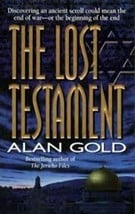
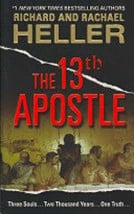
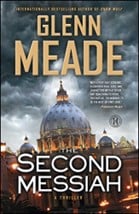
In several Gospel Thrillers, the new “Dead Sea Scroll” foregrounds the uneasy relationship between the foreignness of the Middle East and the familiar, Western Bible that it produced. Some novels, like Daniel Eastman’s The Judas Testament, lean into this sense of estrangement: a new discovery about—or by!—Jesus emerging from the dangerous lands of biblical origins portrays the messiah as a first-century Jewish fanatic, far removed from the meek and mild savior of Protestant hymns. Other novels, like Rachael and Richard Heller’s The 13th Apostle or Alan Gold’s The Lost Testament, temper and ameliorate this biblical otherness: the new discovery transforms Jesus into a more ecumenical figure, departing from his Jewish roots to preach salvation to all humankind. These novels give readers an opportunity to imagine various ways of coming to terms with the Jewishness of a Christian savior.
Heretical Jesus
Other novels plunge their readers into a world of heresy and orthodoxy. They invite us to ponder the possibility that the real teachings of Jesus have actually been suppressed for thousands of years by mainstream churches. The publication of the so-called Gnostic Gospels in the 1970s and then the unveiling of a new Gospel of Judas in the 2000s often inspire earnest religious seekers to push back against what they believe to be misogynist or xenophobic intolerance perpetuated by age-old Christian institutions.
In The Keepers of the Secret, for instance, the real messiah, born of the virgin Mary, was a girl named Lael (Jesus was her foster-brother). A lost scroll written by the apostle John reveals Lael to be a preacher of gnostic wisdom, working miracles through Jesus and staging his “resurrection” before being assassinated by those who would go on to found “the Christian Church.” J. G. Sandom’s Gospel Truths also imagines long-hidden teachings of Jesus that sound more like gnostic wisdom or “Eastern philosophy”: personal liberation that does not require church or scriptures. This message too was suppressed long ago and continues to be squelched by greedy forces operating within the margins of the Roman Catholic hierarchy. In these novels, and others like them, a desire for gender equality or “spiritual” liberation are projected back into the past and explained as progressive truths squashed by “the church.”
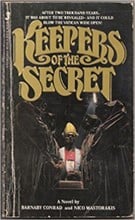
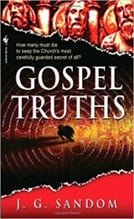
The opposition of institutional religions—particularly Roman Catholicism, which becomes a stand-in in these novels for clerical avarice, self-interest, and intolerance—to the true liberating message of Jesus in Gospel Thrillers amplifies modern unease with “the church,” roiling through US society since the 1960s. In some novels this unease is projected onto distorted “heresies” that have survived underground from antiquity and that seek to hide a lost gospel that would reveal their existence.
The Manicheans in Jonathan Rabb’s The Book of Q have secret cells spread throughout the globe, indoctrinating their followers in their maniacal quest for world domination. In Adam Blake’s The Dead Sea Deception, followers of Judas have lived for thousands of years literally underground, speaking Aramaic and living by a community rule embedded in a fuller version of the Gospel of Judas published in 2007. They emerge into our world to protect their secrecy while they, too, await their chance for world domination.
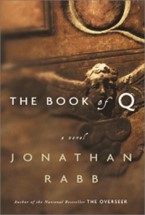
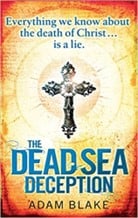
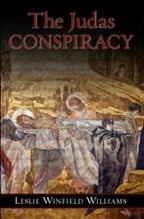
Another fuller version of the Gospel of Judas is brought to light and then stolen by the “Sethian Brotherhood” in Leslie Winfield Williams’ The Judas Conspiracy. An all-male enclave dedicated to moral depravity and spiritual elitism, the “Brotherhood” has worked behind the scenes to bring chaos and disunity to the world stage for centuries. Their string of brutal assassinations culminates in a thwarted attempt to blow up the National Cathedral on Thanksgiving Day.
Some Gospel Thrillers imagine a liberating gospel, revealing the true spiritual message of Jesus suppressed by the orthodox Bible; others depict a perverted group of heretics out to undermine or destroy followers of the orthodox Bible. At work in both narratives is deep ambivalence around the Bible and truth that exists in US culture. Readers eager for a new, progressive “truth” can delight in a Bible exposed as a fraud; at the same time they might be apprehensive about what that new “truth” might bring. It is unsurprising, then, that so many of these novels that toy with the possibilities of secret text and underground sects return their readers, at the end of the novel, to a comforting status quo where orthodoxy and the Bible remain as they were at the outset.
Gospel Thrillers is available at a discount in e-book format now (Amazon and Barnes & Noble) and will be available in the United States in hardback in February 8 (Cambridge Press site; Amazon). For more about the novels and their context, check out my companion website with summaries, reviews, and more information about the Bible and conspiracy. For more information about me, visit my academic website.


 (6 votes, average: 4.83 out of 5)
(6 votes, average: 4.83 out of 5)
There are, of course, some rather more outré approaches. Consider
The Last Days of Christ the Vampire
I will not hold this up as a literary masterpiece. Far from it. But it is an interesting idea.
Based on the available sources, do you think that Jesus knew he was likely to get executed and just accepted the punishment because his faith was more important? Or was his arrest and execution a surprise to him?
I don’t think he expected to be executed. He expected that he’d be made the king.
I think a great thriller would describe what would have happened if Pilate had released Jesus instead of Barabbas.
A lot of the novels introduce a gospel that calls into question the events around the crucifixion, although typically more about Jesus’s resurrection (which would be more theologically challenging) than the crucifixion itself. But I wouldn’t be surprised to see a novel with that idea appear in the future!
I hope you thought of this because of Monty Python’s Life of Brian! 😂
Is it possible to generalize about how faithful to established scholarship these authors are when they’re not inventing new gospels? Do most of them get the basics right, or are you frequently brought up short by howlers?
They are often actually very accurate in how they integrate recent scholarship (many fewer “howlers” than in, say, a certain book by Dan Brown). One of the most famous, Irving Wallace’s The Word (1972) incorporated so much research (I think something like 3 pages on radiocarbon dating) that a reviewer made fun of his “partially digested” chunks of research. I think as in a lot of genre fiction, audiences enjoy the learning experience.
Robert M Price wrote a similar book titled:
Secret Scrolls: Revelations from the Lost Gospel Novels.
In it he goes through 40 of these type of books, give a synopsis then comments on these . A very interesting read.
Indeed! I mention his work in my introduction–his scope was a bit broader (any kind of “lost gospel” novel, including Da Vinci Code which doesn’t really have a lost gospel) and his interests were more theological and aesthetic. Philip Jenkins also mentions some of these books in his Hidden Gospels book.